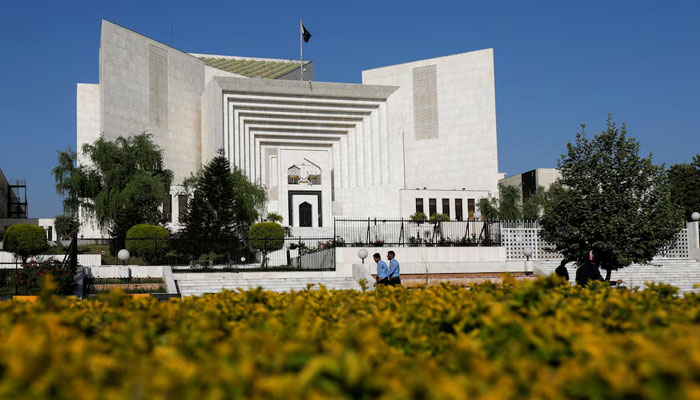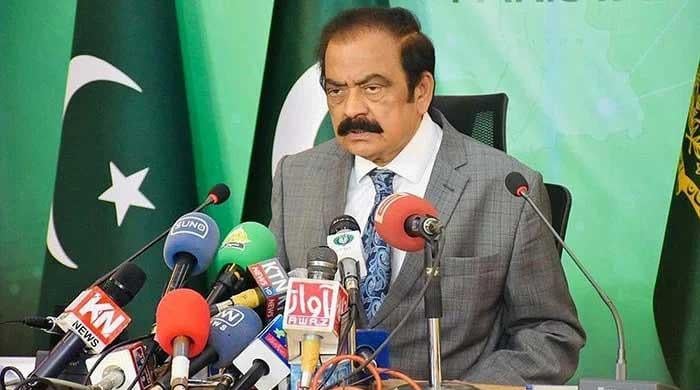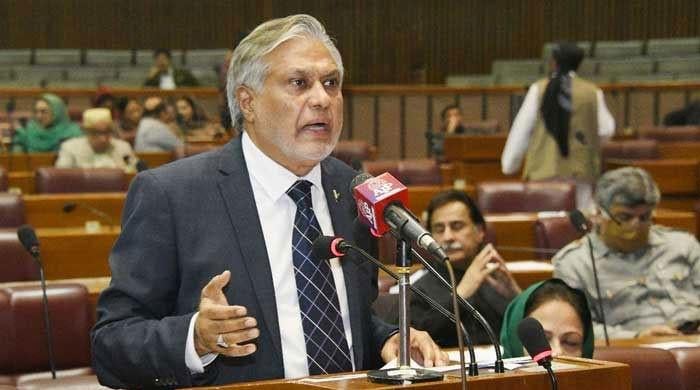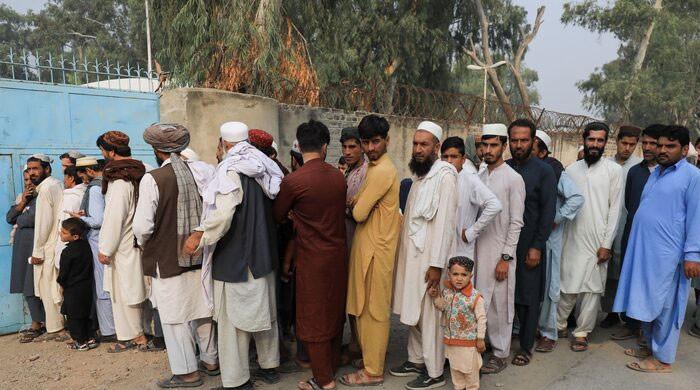Legal experts weigh in on SC ruling to nullify Article 63(A) interpretation
Apex court's judgment comes as coalition government attempts to pass constitutional amendments, deemed controversial by opposition
October 03, 2024

In a major development, the Supreme Court of Pakistan on Thursday annulled its 2022 verdict on the interpretation of Article 63(A) of the Constitution, which barred lawmakers from going against party directions when voting in parliament.
The case discusses the apex court's previous ruling, which stated that votes of parliamentarians who deviated from their party's directives and policies were to be disregarded and not counted.
The five-member bench led by Chief Justice of Pakistan (CJP) Qazi Faez Isa heard the Supreme Court Bar Association's (SCBA) plea before announcing the unanimous judgment.
This development comes as the coalition government is attempting to pass constitutional amendments, deemed controversial by the opposition.
Meanwhile, legal experts and lawyers are divided over the latest verdict, with some saying that it does not align with the legislative intent of Article 63(A)
'Review petition fixed days after constitutional amendment'
Lawyer Asad Rahim Khan disagreed with the original verdict regarding Article 63(A) which, he said, was "difficult to see how the plain text of the Constitution prohibited dissident legislators’ votes from being counted."
He told Geo.tv that the review petition had been "fixed just days after a constitutional amendment seeking to destroy the Supreme Court failed to pass."
"The review bench was formed without Justice Munib Akhtar despite this chief justice having expressly held that review petitions are always heard by the author of the original verdict; and the bench itself was the gift of a presidential ordinance, whereby the executive has tried its best to commandeer the judges," he said.
"That this precisely coincides with opposition party members claiming they are being pressured to vote in favour of the new Dogar Courts amendment has thrown the doors open to a new and sordid era for the justice system."
'Verdict not in line with Article 63(A)'
Barrister Ahmad Pansota believes that the latest SC verdict is "certainly not in line" with the legislative intent of Article 63(A).
He stressed that the legislative intent of Article 63(A), was "very clearly evidenced by what Mr Raza Rabbani had mentioned while in the debates while this Article 63(A) was being formulated and that those debates very clearly articulate that the vote could not have been considered."
"I believe that the decision itself is against the legislative intent of the Parliament. The decision itself is against the very spirit of Article 63 and the Constitution of Pakistan," Pansota told Geo.tv.
"What purpose would it serve if the vote is allowed to go on, and then you take action against them because as a result of such a voting the only the only aspect that can go forward is that of horse-trading."
"And I think that was something which even the Parliament itself could not stop. But the Supreme Court of Pakistan eventually stopped it," he added.
He said that Justice Munib Akhtar's judgment had merely reiterated the legislative intent of 18th amendment, in which Article 63(A) was unsettled.
Concluding his comments, he said: "I disagree with the very spirit of the judgment."
'Why the sudden interest in this case?'
Lawyer Salaar Khan said that a "very strong case" can be made for the original judgment on Article 63(A) not being the appropriate interpretation of the provision and that it read in language to the Constitution which doesn't exist.
"Whether or not the constitutional provision is better or worse off with its inclusion is a separate matter altogether," he told Geo.tv, before adding that it was not for a judge to "add or delete such language from constitutional provisions".
"What is concerning with the court's decision in review, however, extends beyond this. With the proposed 'constitutional package' looming, there is too much beyond the order sheet to ignore," he said.
"Why the sudden interest in the case, after a delay of two years, and to the exclusion of matters that have been pending for even longer? Why the exclusion of Justice Munib Akhtar, the author judge, when he did not recuse himself from the bench?"
He also questioned the necessity to include an ad-hoc judge when there were others available.
"Why was the bench constituted by a committee of only two judges, contrary to the text of the Practice and Procedure Act, even after it was amended?" he asked.
"Against all of these questions, the resistance to the judgment in review will have less to do with the judgment itself, and more to do with the extent to which the Supreme Court has stepped in to facilitate the passage of the proposed constitutional amendment."
'SC has set things on right track'
Commenting on the development, Muhammad Ahsan Bhoon — seasoned lawyer and former president of the Supreme Court Bar Association — said that this is a very “promising” verdict, which is according to the Constitution and law.
Bhoon, who was one of the petitioners of the case in 2022, said that the earlier verdict, given by the previous bench, in the case constituted to “rewriting the Constitution”.
“The verdict included such matters that were not in the Constitution,” he told Geo News. Bhoon maintained that as per the Constitution, a lawmaker who votes against the command of their party will lose their seat in the process.
However, he added, the article did not mention that the lawmaker’s vote won’t be counted.
“But our honourable judges said that neither their votes will be counted and not will they retain their seat,” he said.
When asked about the inefficacy of Article 95 pertaining to a vote of no-confidence following the previous verdict, Bhoon said that the verdict did not only make one article but several others redundant.
The legal expert maintained that a lawmaker can exercise their right to use their vote in the parliament owing to their conscience, as enshrined in Article 239. They will, however, lose their seat. Similarly, if someone loses their confidence in the prime minister and wants to vote, Article 95 will then remain redundant if the previous verdict was to be considered, he added.
“The SC has set things on the right track by interpreting Article 63(A),” said Bhoon.
'Chances for constitutional amendments' success increased'
Pakistan Institute of Legislative Development And Transparency (PILDAT) President Ahmad Bilal Mahboob said chances of success for the constitutional amendment proposed by the government last month had increased manifold, after the Supreme Court verdict.
He said it was a welcoming verdict that had removed the constitutional distortion.
"When the interpretation was made [earlier] and the defected members’ vote was not counted, it had political impacts at that time as well and you saw how the government was changed in the Punjab Assembly,” he said, adding that the interpretation had distorted the country’s law, politics and constitution.
The PILDAT chief said after today’s judgment, that Article 63(A) would be interpreted as per the original text of the Constitution, instead of such an interpretation which altered its wordings.
He said it was quite possible that in the coming days those — who do not agree with the party policy regarding certain matters — step up and vote in opposition to the party's direction. It was a separate matter that the sword of disqualification would be hanging on them, he maintained.
“This may increase the chances of success for the constitutional amendment as the PTI might not be able to challenge a member’s qualification if he voted against party direction as a matter of its party leadership is pending with the election commission.
"So I am not sure if [on this basis] their disqualification could be possible or not,” he said.
Raising 'serious questions' over ruling
Barrister Rida Hosain said that there are "serious questions" regarding the legality of the bench that rendered today’s order.
"The chief justice brushed aside objections raised on the legality of the bench, despite the fact that it was his very exercise of power that was under question," she added.
Barrister Hosain remarked that Justice Munib Akhtar’s removal from the bench was troubling, expressing her view that the judge made clear that he was not recusing from the bench, and there was no lawful justification for the case to proceed without him.
"It is regrettable that the judges who once claimed to stand against the chief justice’s ‘absolute power’ stood by the current chief justice as he exercised absolute power," she added.
Hosain also said that "there was legitimate opposition against the original verdict that included an additional punishment [not counting the vote] of defecting lawmakers in certain prescribed situations".
"However, presently, there are several review petitions pending. The only reasonable inference that can be drawn from the fact that the 63(A) review has been heard at this moment is: the Supreme Court wanted to facilitate the constitutional amendment by the government parties," she added.
'Hastily delivered with potential ulterior motives'
Advocate Sheikh Saqib Ahmed, speaking about the SC judgement, said that it appears to be hastily delivered with potential ulterior motives.
"Today's proceedings seemingly contravene the same law by constituting a bench that became controversial even before the case was heard. The exclusion of Justice Munib Akhtar from the bench, or the failure to constitute the bench in accordance with the current legal framework, raises serious concerns about the propriety of the decision-making process," he said.
Advocate Ahmed said that this recent judgement will do little more than exacerbate the complexity and disorder within the system. "Procedural irregularities and unlawful actions, ranging from the constitution of the bench to the fixation and hearing of the case, cannot and shall not be overlooked," he added.
Ahmed further said that the decision lacks substantive merit and legal reasoning, as the short order fails to provide a single justification for the ruling, adding that it is evident that the case was expedited and heard in an unusually hasty manner, seemingly to further Parliament’s ulterior motives to undermine the basic structure of the Constitution.
'Hastily delivered'
Advocate Sheikh Saqib Ahmed said that the Supreme Court's judgment on the interpretation of Article 63(A)(1)(b) appears to be hastily delivered.
"Shortly after assuming office, Chief Justice Qazi Faez Isa ruled on the fate of the Practice and Procedure Act; however, today's proceedings seemingly contravene the same law by constituting a bench that became controversial even before the case was heard," he said, adding that the exclusion of Justice Munib Akhtar from the bench, or the failure to constitute the bench in accordance with the current legal framework, raises serious concerns about the propriety of the decision-making process.
According to the legal expert, the legality and correctness of the ruling and interpretation is a secondary issue; the primary question is whether the procedure followed in reaching this decision was lawful.
Advocate Ahmed said that the government recently attempted to amend the Constitution in a manner that would have undermined and violated the basic structure of the Constitution of the Islamic Republic of Pakistan. However, the attempt failed as the government was unable to secure the requisite 2/3 majority in parliament, he added.
"In Pakistan's democratic system, members of Parliament and provincial assemblies are often enticed with monetary or political incentives, or coerced, to vote against the directives of their parliamentary party. This article was designed to safeguard the integrity and transparency of the democratic process by upholding true democratic values.
"It strengthened the role and discretion of the parliamentary party, rather than leaving decisions in the hands of individual members who can be easily influenced or coerced in a political environment like Pakistan's," he said.
The expert further stated that the 2022 Supreme Court verdict on the interpretation of Article 63(A)(1)(b) was closely aligned with the core principles of democracy and upheld key Shariah principles. In doing so, the apex court effectively fulfilled the intended purpose of the article.
"In my humble view, this recent judgment will do little more than exacerbate the complexity and disorder within the system. Procedural irregularities and unlawful actions, ranging from the constitution of the bench to the fixation and hearing of the case, cannot and shall not be overlooked," Advocate Ahmed said.
Additionally, the decision lacks substantive merit and legal reasoning, as the short order fails to provide a single justification for the ruling, he added.











